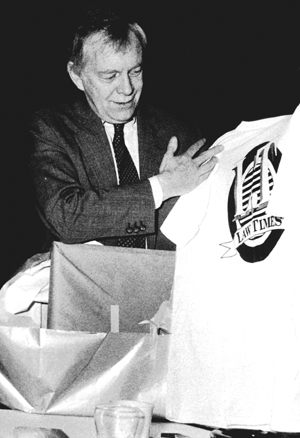"That Mr. Scott has more gall than a poacher''s dog," sniffed a disapproving court officer in a story Ian Scott told of himself in his memoir To Make a Difference.

Gall was only one of the qualities that enabled Scott, who died peacefully in his sleep on Oct. 10 at age 72, to cut a distinctive path through Ontario law and politics.
A successful courtroom lawyer from his early years in practice, he became a politician almost by accident, yet his work as attorney general provided the most substantial achievements of the Liberal Peterson government. Late in life, he gracefully made the world aware that he was a public figure who was also a gay man and would insist on being both.
After his terrible stroke in 1994, he became a heroic example of going boldly on despite a crippling disability.
Scott came from a well-to-do legal and political family in Ottawa. His great grandfather, one of the leading English-speaking Catholics in public life, was a lawyer and a Liberal senator in John A. Macdonald's day. The family firm, Scott & Aylen, was a leading Ottawa law firm for generations. Study came easily to Scott and generally left him lots of time to party.
But with so much handed to him, Scott intended to make the most of it. He joined Cameron Brewin in 1959, took every case going and established himself as a resourceful and innovative litigator, thriving in labour law, in civil and criminal cases, and before administrative tribunals.
Always working hard, playing hard, trusting friends and staff to keep his life organized, he rose steadily. His firm joined the Gowlings megafirm and he eventually served as counsel to a whole series of inquiries, most notably Tom Berger's northern pipeline commission.
But he retained his love of the courtroom and had a particular fondness for appeal court cases. "Appeal work involved the basic principles of law," he wrote in his memoir. "My major concern with the facts was to show how they justified applying one set of legal principles over another."
When the Charter came into force, Scott took some of the first constitutional cases to the Supreme Court of Canada, including the Singh immigration case.
His political career grew mostly out of his limitless confidence in himself and his sense of the need to change governments. Then the fluky victory of David Peterson in 1985 made him attorney general, and Scott found a vocation.
Today the Peterson years seem like an interlude of yuppie innocence before the storms of Bob Rae and Mike Harris. But Scott was a pillar of the government, involved in everything it did.
His own department's initiatives - pay equity, freedom of information, independent judicial appointments, human rights amendments - stand among that government's principal legacies. Not very keen on the Meech Lake accord, Scott supported his government and was tarred by association with it.
In 1990, out of office and still in his 50s, Scott seemed to have limitless potential as senior counsel or senior statesman. Instead, felled by a devastating stroke, he spent 12 years heroically determined not to be silenced or confined by it.
About the same time, he decided his homosexuality, mostly an open secret already, should become part of his public persona. Amazing, how long ago that seems. Just a decade ago, a gay person in public life was still almost shocking.
Justice Stephen Goudge of the Court of Appeal, Scott's colleague and friend for almost 40 years, reminds us Scott was above all a lawyer, a courtroom lawyer.
"He was an advocate. He always found creative, elegant ways to present his cases, ways that courts found interesting and persuasive," says Goudge. "His ability with the English language was fundamental. He had a first-class legal mind, a real ability to get to the heart of an issue. But in presenting that case, he had an articulate way about him that was just appealing.
"I have never seen a lawyer whom courts simply liked to listen to more. His humour, his inventiveness, his sense of the law and his passion for it always came through."
Maybe a little of the gall too.
Christopher Moore is the author of McCarthy Tétrault (2005) and other works in legal history. www.christophermoore.ca

 Gall was only one of the qualities that enabled Scott, who died peacefully in his sleep on Oct. 10 at age 72, to cut a distinctive path through Ontario law and politics.
Gall was only one of the qualities that enabled Scott, who died peacefully in his sleep on Oct. 10 at age 72, to cut a distinctive path through Ontario law and politics.